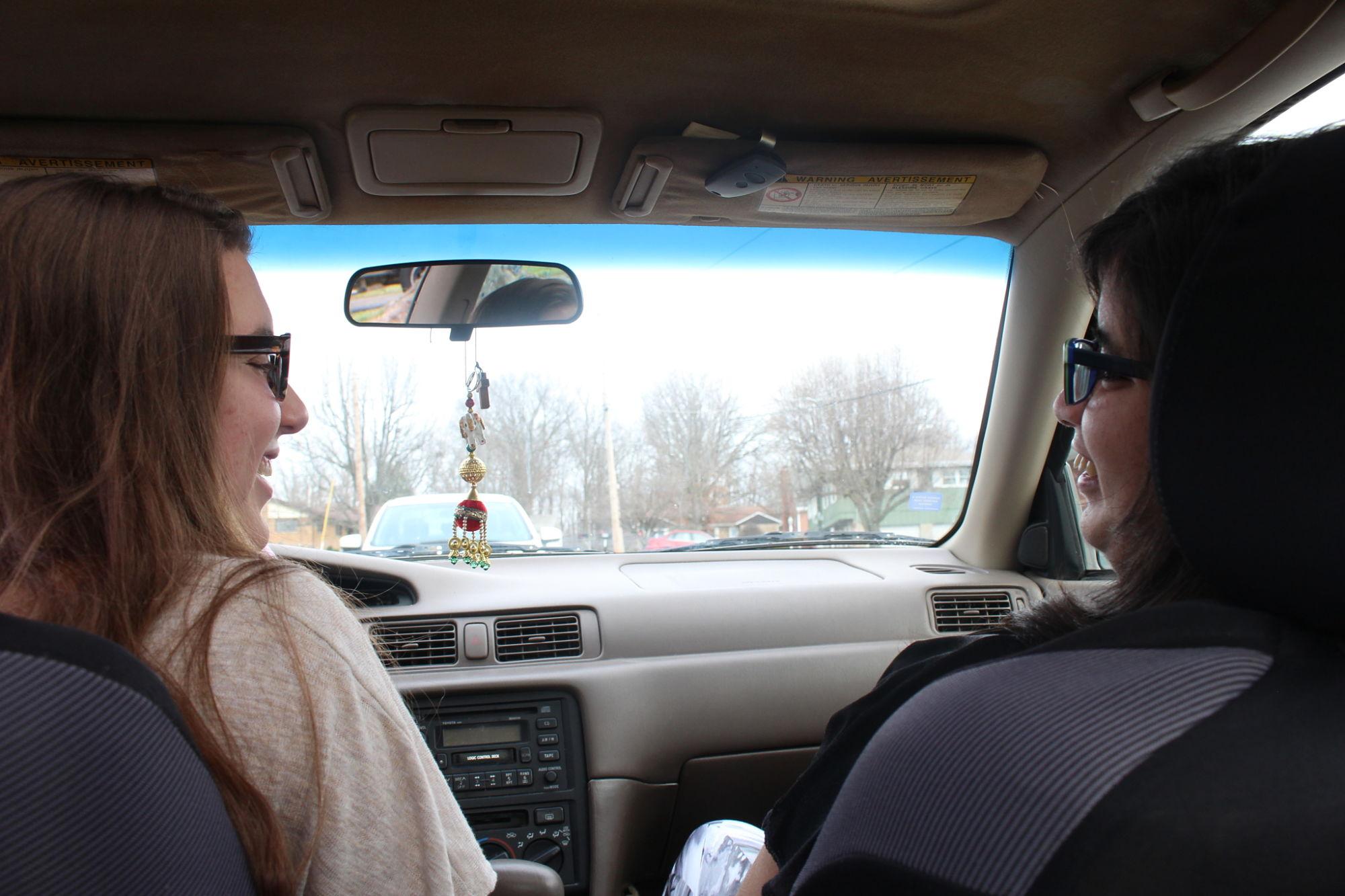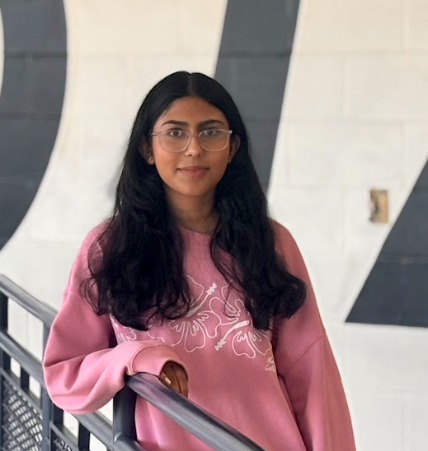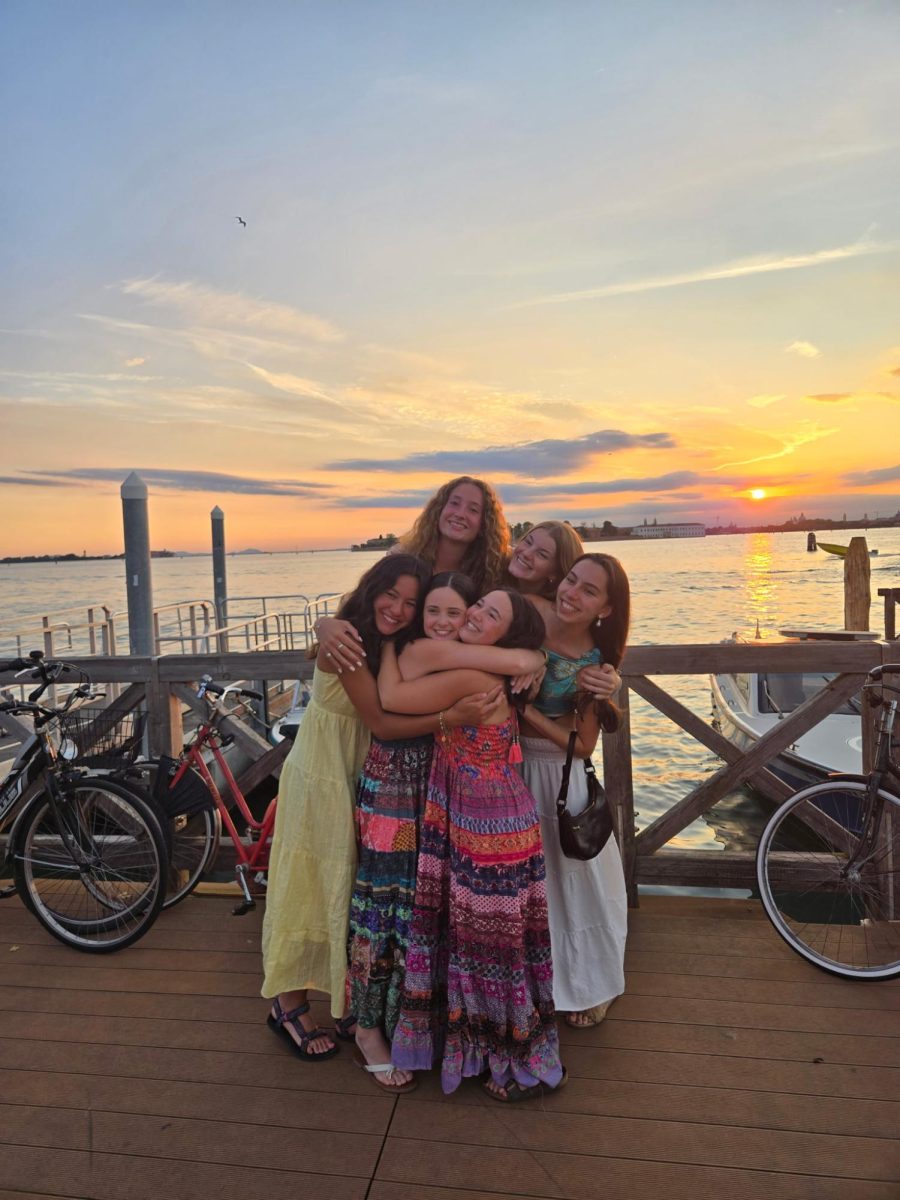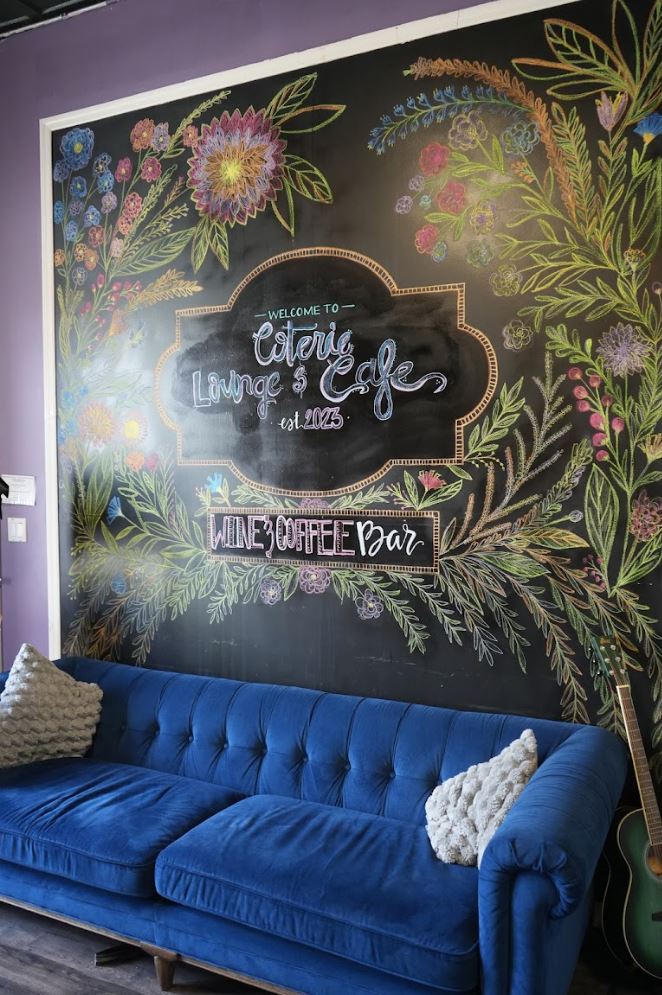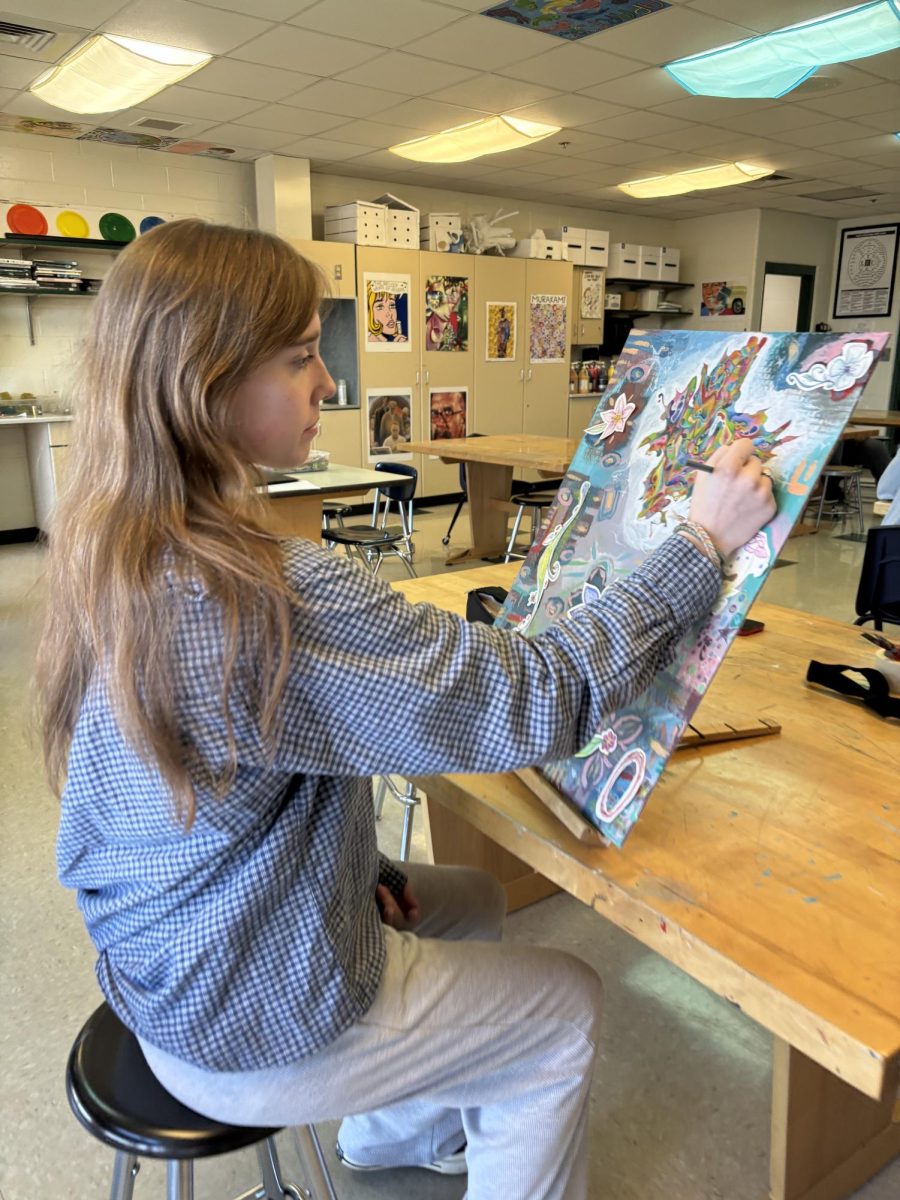By Emma Stiefel| Photography by Sarah Yanzsa
They live in the same house 15 feet apart, give each other clothing advice, can tell when one of them is in a cranky mood, and even finish each other’s sentences.
Unlike most sisters, however, the two girls don’t have to worry about their favorite shirt or pair of jeans mysteriously going missing. One’s short, and the other’s tall. They don’t even wear the same size shoes.
In fact, Mount Notre Dame High School (MND) Senior Graci Doll and University of Cincinnati Blue Ash freshman Prerna Gandhi met only two years ago. Since then, however, the girls have become as close as sisters, and Gandhi now lives with Doll and her parents, Endeavor fifth grade science and social studies teacher Melissa Doll and Duke Energy mechanic operator Scott Doll.
Gandhi came to Cincinnati from Rohtak, India to receive treatment for burns she suffered during an acid attack on June 18, 2011 when she was 13 years old. That day, she and her friend, Yashika Khatri, were riding a scooter home from school. The next thing Gandhi knew, she felt her side burning and fell off the bike.
Two boys had thrown sulfuric acid on her.
The chemical is available to ordinary consumers as a drain cleaner and is also used to make batteries, explosives and fertilizers. It’s extremely corrosive and burned through both the epidermis and dermis of Gandhi’s skin, creating third degree burns on the right side of her face and neck.
The resulting scars would require skin grafts and countless surgeries to heal. But these medical procedures would only mitigate the damage done, not reverse it; Gandhi’s appearance was changed forever.
She didn’t know any of this, however, as she laid on the ground and watched as her skin fell off and disintegrated into ash.
“I had no idea what happened,” says Gandhi. “I had never even heard of acid attacks before my attack. I felt like my whole side was on fire, but I didn’t get what was going on.”
Then she heard a few women, who had heard her and Khatri’s cries for help, say, “Oh, someone threw acid on this girl.’” But she still didn’t understand. “‘Ok, what is acid?’” she wondered. “‘And why did they throw acid on me?’”
She was rushed to the hospital, where she found out what had happened. While she was recovering, the police came to question her about the incident. Since many acid attacks in India are associated with shaming a woman for some perceived offense, they assumed that the two boys must have targeted her because she had offended them and wanted Gandhi to tell them what she did to make them assault her. But Gandhi didn’t know the boys.
It was eventually discovered that they had been hired by Khatri’s aunt to attack her, not Gandhi. The aunt had seen her niece driving the motor bike earlier and gave the boys instructions to “‘drop acid on the girl driving the motorbike,’” not knowing that Gandhi and Khatri would switch places.
Gandhi still doesn’t know the full story of why Khatri’s aunt would want to harm Khatri. She’s heard that the aunt was envious of the Khatri family, possibly because of a rivalry over being able to marry off their children. The aunt had only one daughter and no sons, so she wouldn’t receive a dowry from her child’s marriage. And so it would seem that, jealous of her sister, she decided to “destroy their family” by attacking her niece with acid.
“A lot of times in India, there are family feuds based off of trying to be the best,” Graci helps explain. “So there’s competition, and in the competition, I guess you feel like you have to destroy someone else’s face.”
The aunt’s plan failed, of course, and it was Gandhi’s face that was destroyed, not Khatri’s (only a few splashes of acid landed on her neck and arm). After the attack, Gandhi’s life “revolved around surgeries and surgeries” as she was treated at the Rohtak Post Graduate Institute of Medical Sciences and then the Apollo Hospital in New Delhi.
“Looking at my condition, I thought my life just ended,” says Gandhi. “I thought I wouldn’t be able to study any more and stuff like that, but my parents forced me. [They said] ‘Prerna, you have to study, because for a normal person if you don’t study there is nothing,’ so I got motivation from that.”
She did study, but at home, away from her friends. The only times she went to school her sophomore year were to pass her 10th and 11th grade exams, which she took in a separate room with only teachers present. When she did start leaving the house, it was at night, and she always covered her face with scarves to hide her scars.
“I never talked to my friends anymore,” says Gandhi. “I felt ashamed like I looked horrible, and I didn’t want to face those people. But my friends were supportive, they came to me, [and] said ‘Prerna you’re fine.’”
She returned to school for 12th grade and graduated in 2014 when she was 16. It was then that Gandhi’s uncle, who often traveled for his job, started looking for a foreign hospital that could better treat her injuries.
He eventually discovered Shriners Hospital in Cincinnati, which the family could afford since it treats patients for free until they turn 21. The hospital’s doctors would primarily work on reconstructing Gandhi’s scars, which had contracted and were restricting her range of motion, as well as on cosmetic procedures like giving her the appearance of eyebrows.
While focusing on Gandhi’s medical care, the Shriners Hospital staff also wanted to make sure that she was supported socially. Matt and Heidi Flege, who hosted her and her mother when they first came to Cincinnati, helped her meet people in the area.
“While she did travel to the United States for medical care, we also wanted her to have some structure and routine,” says Shriners Hospital Social Work Care Manager Donna McCartney. “We really worked with her on all levels. A lot of that came from her host family making connections, some came from the community and some were made through the hospital.”
And so the day came when, hoping to introduce her to another girl her own age, Matt and Heidi brought Gandhi to the Dolls’ house to meet Graci. Their first meeting didn’t go so well; Graci, who had had a swim meet earlier, was sleeping.
Soon after that, however, Gandhi walked past the Dolls’ garden, where Graci was picking tomatoes. They exchanged awkward “hi”s, and Graci promised to come visit Gandhi and take a walk with her.
“A couple days later, we went for a walk,” says Graci. “We talked about just random stuff. American stuff, Indian stuff, comparing [the countries], and she talked a little bit about going to college here because she thought America was pretty cool. After that I made a point to do stuff with her like watch horror movies. She loves horror movies.”
While watching movies like “Cabin in the Woods” and “The Human Centipede,” the two girls got to know each other and became good friends. Then that fall, Gandhi told Graci that she was bored every day because all she did was sit in the Flege’s house. Graci came up with the idea of them going to MND together and emailed the school’s administrators, who decided that Gandhi could shadow classes.
During December, however, Gandhi found out that the Fleges would be moving. When Gandhi told Graci about their impending relocation, she immediately suggested that Gandhi move in with her.
At first, Gandhi thought she was “just being nice,” but by July, they were living under the same roof. That summer, they were constantly together, often sitting side-by-side in Graci’s brown Toyota Camry, driving around Cincinnati.
“We drove everywhere last summer,” says Graci. “Our car is like the symbol of our friendship because it’s where most of our memories happen, where we’ll just die from laughing and stuff like that.”
Gandhi also grew closer to Melissa and Scott after moving in with Graci. Gandhi and Scott enjoy cooking and experimenting with dishes like Indian meatloaf, and she often spends time with Melissa while Graci is at swim practice. She affectionately calls them Ma and Pops, and they see her as their own child.
Graci’s other relatives also understand that “Prerna’s part of the family,” says Melissa, and have met Gandhi at various holiday gatherings. The grandparents of the family “worry about her just as much as they worry about the other ones,” and ask about Gandhi’s school work and her well-being.
While spending time with her “new family” in America, Gandhi has continued to communicate with her own parents and younger brother, who live in India, through Skype. Last August, however, she got to see them in person when she went back home for the first time. She returned to America in December in time for her to celebrate Christmas with the Dolls.
While back in India, Gandhi attended festivals and weddings, went clothes shopping and saw her friends and other people she had known before she left for America, many of whom were shocked to see how confident she was.
“When I went back to India, I started wearing short sleeves,” says Gandhi. “I was so proud of myself. People, when they saw me, were happy and surprised about how my personality changed. Before, I wouldn’t talk or laugh or stuff like that, and now I’m just normal.”
When she first came to Cincinnati, Gandhi would always cover up her scars by wearing long sleeves and a Hello Kitty scarf and styling her hair so that it masked the right side of her face; she was willing to suffer through the summer heat in order to avoid others’ stares.
Graci, however, was concerned about Gandhi’s discomfort. She began sweetly but forcefully encouraging her to dress for the warm weather. Eventually, after getting short-sleeve shirts and swimsuits for Gandhi and pulling her hair back, Graci’s big sister-like persistence paid off. Now she happily points out how, after pushing Gandhi’s hair into her face to demonstrate how she used to wear it, she flicks it back so that her face is showing.
Melissa sees Gandhi’s current “outgoing, bubbly personality” as a re-emergence of what was “suppressed in her when everything happened.”
“There’s a video of Prerna when she was little,” says Melissa. “She has these little bell things on, and she’s making all this noise doing a traditional dance. You see this little preschool-aged girl [with an] energetic attitude. You knew that if you were her mother and took her out in public, you had to keep your eye on her or she was going to be gone in a minute.”
Now the vitality of that little girl has been brought back out in Gandhi but in a renewed definition. She loves to make friends and dance and, as Melissa and Scott have observed, isn’t really different from any other teenage girl.
“You hear a story [like Gandhi’s], and [you think] that that happens to some kid in some remote area whose life is so different from mine,” says Melissa. “But her life is really not any different from your life up until that point.”
It can be difficult for people to realize that “there’s no difference between Prerna, the victim of an acid attack, and any [other girl],” when it makes them think about what they would do if the same terrible thing that happened to Gandhi happened to them or their child. Despite this discomfort, however, Melissa believes that “we need to wake up as a country to looking at [how, if] we want to say we do good, why are we allowing these things to happen in different countries?”
“When it becomes uncomfortable, we say it’s a culture difference,” she says. “[But] it’s not like saying, ‘They wear bright beautiful clothing and dance their traditional dance, and I don’t want to do that.’ That’s a culture difference. A culture difference is their food. A culture difference is not where you cause harm and we turn and say ‘that’s your country’s culture,’ because that should not be a part of your country’s culture.”
Though they can see that “people’s children in different countries are no different than our children,” Melissa and Scott aren’t planning on trying to take in any other needy people from around the world. In fact, they aren’t planning at all. For them “there’s only one Prerna,” and they see their lifelong commitment to her as nothing more than “we have a daughter, and these are her needs.”
“If you try to help everybody, you’re kind of only saying, ‘Look at me, I’m helping everybody,’” says Scott. “But when you focus all your energy on one person, and then that person focuses on somebody, that’s how it changes.”
The Dolls will be changing the world, then, through car rides to and from college classes and doctor’s appointments, through conversations over Skype and around a language barrier, through watching movies and playing on the Wii, through mixing cultures into meals like spices, through Graci and Gandhi’s petty arguments and adventures getting lost downtown and laughter and plans for the future and late-night conversations about life, and through simply being a family.


